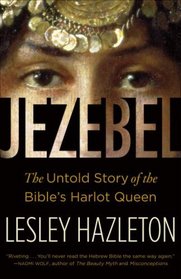Lesley Hazleton has done a superb job of filling int the context and teasing out the facts regarding Jezebel. This well footnoted book, with its frequent asides and rich background material, moves quickly and surely. It is fascinating to read, and ends altogether too soon.
Jezebel, whom we learn really was called Itha-Baal, was a Phoenician princess from Tyre who married the Omride King Ahab. She appears to have been neither significantly better nor significantly worse than other royalty of her time. Nevertheless, her spectacular clash with the intransigent desert prophet Elijah eventually resulted in her being denigrated and reviled unfairly in the Hebrew Bible.
Add to that the fact that the current understanding of language has changed so much that many no longer understand such terms as metaphor and allegory. (For the effects of this lack of understanding, see, for instance, Karen Armstrong's excellent work, "The Battle for God.") As a result, the term "harlot," which was applied metaphorically in Biblical times to those who worshipped many gods and were not too fussy about which gods they worshipped, has come to be understood literally. Not so, Ms. Hazleton points out quite correctly. And she goes on to show that the Biblical account in Kings in fact makes no claim that Jezebel literally was a harlot in the sexual sense. Ms. Hazleton similarly addresses other misreadings and euphemistic mistranslations throughout this book. All of these should be of interest to anyone interested in learning what actually has been said of Jezebel, even by the victors who so reviled her.
In summary, "Jezebel" is a smooth-flowing work which is a delight to read while being educational at the same time. This book is well worth the time and money. A keeper.
Jezebel, whom we learn really was called Itha-Baal, was a Phoenician princess from Tyre who married the Omride King Ahab. She appears to have been neither significantly better nor significantly worse than other royalty of her time. Nevertheless, her spectacular clash with the intransigent desert prophet Elijah eventually resulted in her being denigrated and reviled unfairly in the Hebrew Bible.
Add to that the fact that the current understanding of language has changed so much that many no longer understand such terms as metaphor and allegory. (For the effects of this lack of understanding, see, for instance, Karen Armstrong's excellent work, "The Battle for God.") As a result, the term "harlot," which was applied metaphorically in Biblical times to those who worshipped many gods and were not too fussy about which gods they worshipped, has come to be understood literally. Not so, Ms. Hazleton points out quite correctly. And she goes on to show that the Biblical account in Kings in fact makes no claim that Jezebel literally was a harlot in the sexual sense. Ms. Hazleton similarly addresses other misreadings and euphemistic mistranslations throughout this book. All of these should be of interest to anyone interested in learning what actually has been said of Jezebel, even by the victors who so reviled her.
In summary, "Jezebel" is a smooth-flowing work which is a delight to read while being educational at the same time. This book is well worth the time and money. A keeper.




